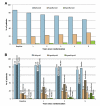Thyroid function in heart failure and impact on mortality
- PMID: 24159562
- PMCID: PMC3803999
- DOI: 10.1016/j.jchf.2012.10.004
Thyroid function in heart failure and impact on mortality
Abstract
Objectives: The aim of this study was to investigate whether patients with systolic heart failure (HF) and abnormal thyroid function are at increased risk for death.
Background: Thyroid hormone homeostasis is vital to the optimal functioning of the cardiovascular system, but an independent prognostic effect of thyroid abnormalities in patients with HF has not been established.
Methods: In SCD-HeFT (Sudden Cardiac Death in Heart Failure Trial), which randomized patients with ischemic or nonischemic HF to placebo or amiodarone or implantable cardioverter-defibrillator therapy, thyroid-stimulating hormone (TSH) was measured at baseline and at 6-month intervals throughout the 5-year study.
Results: Of 2,225 patients, the majority (87%) had normal TSH levels (0.3 to 5.0 μU/ml) at baseline, 12% had values suggestive of hypothyroidism, and 1% had values consistent with hyperthyroidism. Compared with euthyroid patients, those hypothyroid at baseline were older and included more women and Caucasians (all p values <0.05). Over the median follow-up period of 45.5 months, among patients euthyroid at baseline, 89 developed abnormally low TSH levels, and 341 developed abnormally high values. Patients randomized to amiodarone (median dose 300 mg) had an elevated risk for developing abnormal TSH levels compared with implantable cardioverter-defibrillator therapy or placebo (p < 0.0001). Patients with baseline or new-onset abnormal thyroid function had a higher mortality than those with normal thyroid function, even after controlling for other known mortality predictors (hazard ratio: 1.58; 95% confidence interval: 1.29 to 1.94; p < 0.0001 for hypothyroid; hazard ratio: 1.85; 95% confidence interval: 1.21 to 2.83; p = 0.0048 for hyperthyroid). Implantable cardioverter-defibrillator benefit did not vary with thyroid function.
Conclusions: Abnormal thyroid function in patients with symptomatic HF and ejection fractions ≤35% is associated with significantly increased risk for death, even after controlling for known mortality predictors.
Figures



Comment in
-
Clinical implications of abnormal thyroid function in heart failure.JACC Heart Fail. 2013 Feb;1(1):56-7. doi: 10.1016/j.jchf.2012.11.004. Epub 2013 Feb 4. JACC Heart Fail. 2013. PMID: 24621798 No abstract available.
References
-
- Helfand M. Screening for subclinical thyroid dysfunction in nonpregnant adults: a summary of the evidence for the U.S. Preventive Services Task Force. Ann Intern Med. 2004;140:128–41. - PubMed
-
- Canaris GJ, Manowitz NR, Mayor G, Ridgway C. The Colorado Thyroid Disease Prevalence Study. Arch Intern Med. 2000;160:526–34. - PubMed
-
- Hunt SA, Abraham WT, Chin MH, et al. for the American College of Cardiology, American Heart Association Task Force on Practice Guidelines, American College of Chest Physicians, International Society for Heart and Lung Transplantation, Heart Rhythm Society ACC/AHA 2005 guideline update for the diagnosis and management of chronic heart failure in the adult: a report of the American College of Cardiology/American Heart Association Task Force on Practice Guidelines (Writing Committee to Update the 2001 Guidelines for the Evaluation and Management of Heart Failure): developed in collaboration with the American College of Chest Physicians and the International Society for Heart and Lung Transplantation: endorsed by the Heart Rhythm Society. J Am Coll Cardiol. 2005;46:e1–82. - PubMed
-
- Jessup M, Abraham WT, Casey DE, et al. 2009 focused update: ACCF/AHA guidelines for the diagnosis and management of heart failure in adults. A report of the American College of Cardiology Foundation/American Heart Association Task Force on Practice Guidelines. J Am Coll Cardiol. 2009;53:1343–82. - PubMed
-
- Writing Group Members. Lloyd-Jones D, Adams RJ, et al. American Heart Association Statistics Committee and Stroke Statistics Subcommittee Heart disease and stroke statistics—2010 update: a report from the American Heart Association. Circulation. 2010;121:e46–215. - PubMed
Publication types
MeSH terms
Substances
Grants and funding
LinkOut - more resources
Full Text Sources
Other Literature Sources
Medical
Research Materials
Miscellaneous

